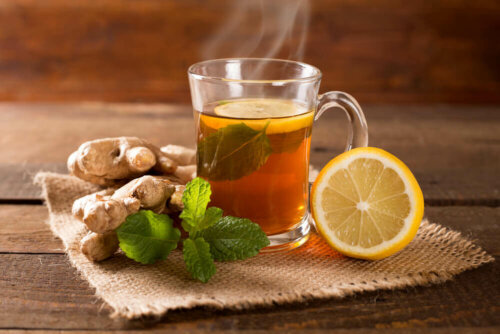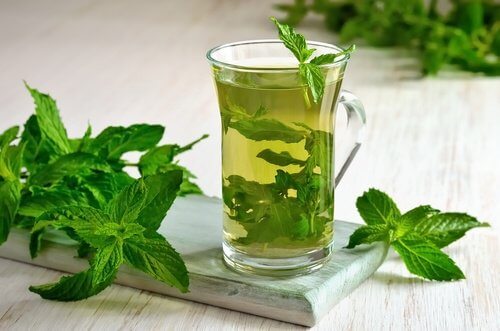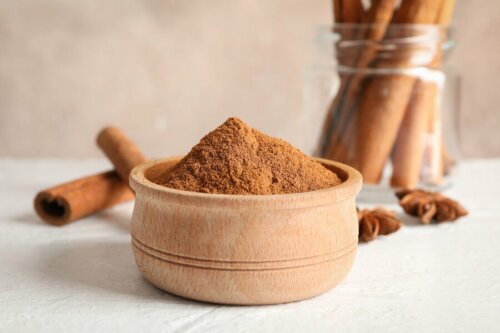The Eight Best Infusions for Intestinal Gas

Intestinal gas is a common problem which, if not relieved quickly, can cause abdominal pain and inflammation. To prevent this, it’s good to know some homemade remedies you can use to help combat gas quickly.
Among the many possible causes of excess gas is the movement of the stomach and intestines themselves, along with the bacterial activity associated with digestion. Fortunately, there are some infusions that can help to expel gas and provide relief.
In this article, we’ll show you 8 of the best infusions for intestinal gas, according to popular belief.
1. Anise infusion

Star anise tea is one of the most popular infusions against intestinal gas, as it is said to aid digestion, and help reduce inflammation.
However, it is not recommended for pregnant women, as it may cause uterine contractions and other issues.
Ingredients
- 4 anise stars
- 1 cup of water (250 ml)
Instructions
- First, boil the cup of water.
- Once it comes to the boil, add the star anise.
- Steep for 10 minutes.
- Drink slowly, taking small sips.
2. Fennel infusion
Fennel’s digestive properties have been used to help treat different types of gastrointestinal problems such as flatulence, inflammation, and cramps.
According to popular belief, you can strengthen these effects with a bit of cardamom to quickly expel uncomfortable gas. This plant is said to stimulate the production of digestive enzymes and provide relief.
Ingredients
- 1 1/2 tablespoons of fennel (15 grams)
- 1/2 tablespoon of cardamom (3 grams)
- 1 cup of water (250 ml)
Instructions
- Boil the water.
- Once boiling, add the fennel and cardamom.
- Cover and let steep for 10 minutes.
- Drink 15 minutes after eating.
3. Ginger infusion

This study of herbal medicine explains that the digestive properties of ginger may be related to its ability to increase gastric motility, and its positive effects on trypsin – a pancreatic enzyme involved in digestion.
Ingredients
- 1 piece of ginger root.
- Juice from 1/2 lemon.
- 1 tablespoon of honey (25 grams).
- 1 cup of water (250 ml).
Instructions
- First, bring the water to the boil and add the ginger root.
- Lower the heat and cook the root for two to three minutes.
- After that time, remove the root and add the lemon juice and honey.
- Wait until it has cooled a bit, then drink.
- Drink up to three cups a day.
Note: Ginger is not recommended during pregnancy, breastfeeding, or while taking anticoagulants.
4. Chamomile infusion
Chamomile is a plant with anti-inflammatory and gas-reducing properties that may help reduce gas in the intestinal tract. A chamomile infusion can improve digestion and reduce symptoms such as pain and distension.
Ingredients
- 2 tablespoons of fresh chamomile (20 grams).
- 1 cup of water (250 ml).
- Honey (optional).
Instructions
- Boil the water.
- Once it reaches boiling point, add the chamomile.
- Cover and steep.
- Strain through a colander, add the honey to sweeten, then drink.
- Drink two or three cups a day.
5. Mint infusion

Ingredients
- 2 tablespoons of fresh mint (20 grams)
- 1 cup of water (250 ml)
Instructions
- Bring the cup of water to the boil.
- Then, add the fresh herb.
- Wait until it has steeped for a few minutes, then remove from the heat.
- Strain the liquid from the herb using a colander, then drink the infusion.
6. Cumin infusion for intestinal gas
This natural drink helps to release excess gasses accumulated in the body and relieve stomach nerves. As such, we would recommend it as a natural remedy against intestinal gas. According to a study published by the University of Oxford, cumin also stimulates the production of bile acids.
Ingredients
- 1 tablespoon of cumin (10 grams)
- 1 cup of water (250 grams)
Instructions
- Bring the water to the boil and add the cumin.
- Cover for a few minutes, strain, and drink.
- For better results, mix with fennel.
7. Boldo infusion
Boldo is a natural gas-reliever which, according to the European Scientific Cooperative on Phytoterapy, is a mild digestive that can contribute to mild gastrointestinal disorders and expel accumulated gas.
Ingredients
- 2 tablespoons of dried boldo leaves (20 grams)
- 1 cup of water (250 ml)
Instructions
- Bring the water to the boil. Once boiling, add the boldo leaves.
- Leave on a low heat for three minutes, then remove from the heat.
- Leave it to steep, then strain and drink.
8. Cinnamon infusion

This natural drink is recommended for people that have difficult digestion and experience discomfort caused by intestinal gas.
Ingredients
- 1 tablespoon of powdered cinnamon (10 grams)
- 1 cup of water (250 ml)
Instructions
- Boil 1 cup of water.
- Once it comes to the boil, add the ground cinnamon and let steep for 10 minutes.
- Drink after meals.
Improve your eating habits and take care of your health
For best results, you’ll need to improve your dietary habits, reducing the amount of saturated fats, processed foods, and sugar, and making sure to avoid any foods which could contribute to abdominal distension and the build-up of gas.
Now that you know these home remedies, choose whichever drink you like best and experience its benefits for your digestive health.
All cited sources were thoroughly reviewed by our team to ensure their quality, reliability, currency, and validity. The bibliography of this article was considered reliable and of academic or scientific accuracy.
- Azimi P, Ghiasvand B, et al. Effects of Cinnamon, Cardamom, Saffron, and Ginger Consumption on Markers of Glycemic Control, Lipid Profile, Oxidative Stress, and Inflammation in Type 2 Diabetes Patients. Rev Diabet Stud. 2014 Fall-Winter;11(3-4):258-66.
- Bode A, Dong Z. “The Amazing and Mighty Ginger” en Herbal Medicine: Biomolecular and Clinical Aspects. 2da edición.
- Dugasani S, Pichika MR, et al.Comparative antioxidant and anti-inflammatory effects of [6]-gingerol, [8]-gingerol, [10]-gingerol and [6]-shogaol. J Ethnopharmacol. 2010 Feb 3;127(2):515-20.
- Krishnapura Srinivasan. Cumin (Cuminum cyminum) and black cumin (Nigella sativa) seeds: traditional uses, chemical constituents, and nutraceutical effects. Food Quality and Safety, Volume 2, Issue 1, 6 March 2018, Pages 1–16. Oxford Acdemic online.
- Mashhadi N, Ghiasvand R, et al. Anti-Oxidative and Anti-Inflammatory Effects of Ginger in Health and Physical Activity: Review of Current Evidence. International Journal of Preventive Medicine. 2013;4(Suppl 1):S36-S42.
- Mashhadi N, Ghiasvand R, et al. Effect of Ginger and Cinnamon Intake on Oxidative Stress and Exercise Performance and Body Composition in Iranian Female Athletes. Int J Prev Med. 2013 Apr; 4(Suppl 1): S31–S35.
- McKay D, Blumberg J.A review of the bioactivity and potential health benefits of peppermint tea (Mentha piperita L.). Phytother Res. 2006 Aug;20(8):619-33.
- Semwal R, Semwal D, et al. Gingerols and shogaols: Important nutraceutical principles from ginger. Phytochemistry. 2015 Sep;117:554-68.
This text is provided for informational purposes only and does not replace consultation with a professional. If in doubt, consult your specialist.








